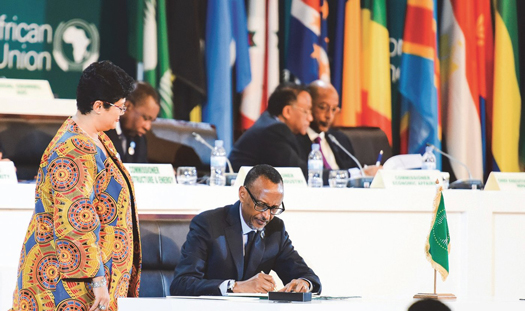
Africa from exporter of raw material to supplier of manufactured goods

Africa’s intra-regional commerce as a share of its overall trade rose a mere seven percent from eight percent in 2011, points out Moody’s, the rating agency. The continents total inter-continental exports in 2016 amounted to just 18 percent of Africa’s total exports. Compare that with intraregional exports in Asia and Europe, with 59 percent and 69 percent respectively, according to the Brookings Institution.
A potential game changer is the recently signed African Continental Free Trade Area (ACFTA), supported by the 55-member African Union, reports The Hindu. ACFTA “seeks to create a single market in goods and services, free movement of persons and investment, and eventually a customs union with a common external tariff.”
With some African countries ranking some of the “fastest-growing economies” ACFTA could tap this potential for greater trade integration. In addition, Moody’s also points out that intra-African exports in manufactured goods are more than double than to countries outside of the continent. These discoveries strongly suggest the expectation of a “continent-wide single market would enable Africa’s transformation from an exporter of commodities and raw materials to a supplier of finished manufactured goods.”
Was Nigeria right to not sign Africa trade pact?
Prior to not signing ACFTA, Nigeria also passed on the opportunity to sign the Economic Partnership Agreement between the Economic Community of West African States and the European Union, also citing the need for further consultation.
Nigerian president Muhammadu Buhari was among 11 heads of states who did not sign ACFTA.
“If Nigeria’s reason for avoiding free trade agreements (FTA’s),” according to the online publication Nairametrics, “is the harm they would do if cheaper imports are allowed into its market, what about the harm such avoidance would do to consumers who earn the minimum wage and would be better off with cheaper imports or export manufacturers who need newer markets for survival or growth?”
The question is why isn’t Nigeria seeking bilateral or multilateral FTA’s “that are strategic to its economic growth?” If the current ACFTA is consistent with a “clear and robust long-term trade strategy,” then what excuse does Nigeria and others have in not signing?
Note: Only 90 percent of recognized commodities would be liberalized under ACFTA, meaning Nigeria could decide what industries or products it considers fragile and ensures they are effectively protected. Secondly, Nigeria could ensure its manufacturers are properly enabled by resuscitating or ensuring implementation of strategic sectorial incentives.
Women entrepreneurs, women’s rights in the African Union workplace

The African Development Bank, playing host to the Economic Community of West African States (ECOWAS) workshop proclaimed they were ushering in a new era of women’s roles in West Africa’s energy transition. Currently the energy sector is made up of only two percent women entrepreneurs. Of the more that 60 workshop participants over one-third were women executives.
During his talk the ambassador of Spain to the Ivory Coast, Luis Covarrubias, noted that the regional initiative would facilitate participation of women in the energy sector as suppliers of modern energy services and solutions, and elevate them from being considered mere consumers.
Canada applauded the effort saying that it addressed the same issues Canada is working towards addressing, which includes “women’s empowerment … promoting a leadership role for women in the renewable energy sector of Africa,” said Simon Snoxell.

Also speaking out against discrimination in the African Union workplace was the African Union Commission chairperson Moussa Faki Mahamat, who vowed to fight sexual discrimination against women and called for the Pan African Parliament to be given full legislative powers to help address the problem facing the continent.
The chairman, according to Enca Africa, said the problem faced by the African Union is that member states “failed to ratify many of the instruments adopted by the continental organization. Words have to be turned into actions,” he stressed.
“I’m committed to getting rid of gender discrimination and sanctions will be imposed on anybody or person we find discriminating against women,” the African Union Commission head said.
The vestiges of apartheid in South Africa alive and well

To discover remnants of South Africa’s apartheid regime you need go no further than its unequal student sports programs. Go to one of the private schools that cater to Whites, you’ll find a indoor sports gymnasium where tennis, hockey, netball and soccer are played. You’ll also discover two swimming pools–one for beginners and one for water polo and senior swimming. Looking further and you’ll discover the campus has six tennis courts, two cricket ovals with turf wickets. More sports fields are under construction.
Just a few miles down the road is a public school that caters to Blacks from the area. The school has no sports program.
Formal education was introduced in South Africa during the 19th century. Blacks received education from mission schools run by a wide range of religious denominations, according to Polity. These schools had “no decent sporting facilities,” and they played sports separate from Whites.
When apartheid was formalized the situations worsened. Education departments wouldn’t provide Black schools with decent facilities for sports. Their reasoning, according to the country’s control laws, “Africans could not obtain permanent residence in cities. Why, apartheid authors reasoned, spend money on people who legally weren’t allowed in certain areas?”
The arrival of democracy in South Africa in 1994 provided little relief.
Historically White schools are reluctant to compete with Black township schools. They hold closed inter-school tournaments catering to other similarly resourced schools on their well-maintained sports fields. A phenomenon similar to what has historically happened with Black talent in the U.S. is talented Black students are “poached” from township schools with promises of scholarships, etc.












